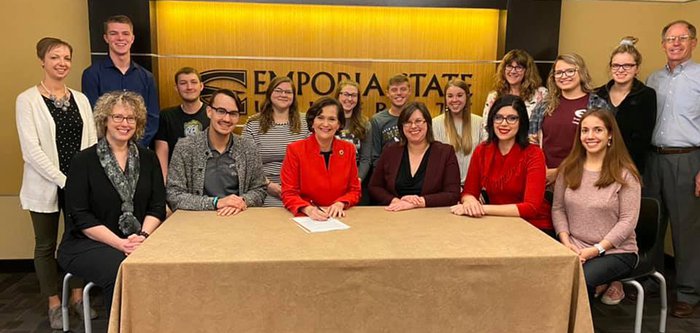A signing ceremony last week on the Emporia State University campus brought together students, faculty and staff committed to fighting food insecurity both on campus and off. Emporia at the Table: Ending Hunger in our Community, called the EAT Initiative, is collaborating with programs that already exist and working across campus to share the message in classrooms and to the public.
On Oct. 15, ESU President Allison Garrett signed the Presidents’ Commitment to Food and Nutrition Security, a key component of Presidents United to Solve Hunger, or PUSH, which came out of the Universities Fighting World Hunger initiative.
ESU has been part of Universities Fighting World Hunger the better part of a decade,” said Dr. Rob Catlett, associate profess of mathematics and economics and director of ESU’s Center for Economic Education. “When we saw the PUSH campaign we thought we’re already on target with many of these things so we wanted to go ahead and go with it.”
The trio of Dr. Rebecca Rodriguez Carey, assistant professor of sociology, anthropology and crime and delinquency studies; Blythe Eddy, director of student activities and community service; and Dr. Jasmine Linabary, assistant professor of communication and theatre, used a high-impact learning grant to launch the EAT Initiative in fall 2019.
“We have a number of campus and community partners,” said Linabary. “These include Associated Student Government, Community Hornet's and Corky's Cupboard, Diversity Student Programs, Student Wellness Center and University Libraries & Archives on campus. Community partners include Healthier Lyon County, Lyon County Food and Farm Council, and the Salvation Army food pantry.”
The initiative focuses on education, research and action. Already this semester, Max Kaniger, founder of Kanbe’s Markets, a nonprofit aimed to eliminate food deserts, presented a lunchtime talk, and the Diversity Book Club is reading “$2.00 a Day: Living on Almost Nothing in America.”
On Oct. 16, a World Food Day event in the Memorial Union brought together information and opportunities to get involved.
“We had a number of events dedicated to action and education about food insecurity in our community,” said Linabary. “We had exhibits from folks on campus like Corky’s Cupbard, ASG and Can the Bods, Student Wellness and opportunities to share your story and to watch a documentary about food insecurity in America and films from a short film festival.”
Carey is one faculty member who has incorporate the topic into the classroom.
“I teach Introduction to Sociology, and my students are putting together an exhibit about food insecurity,” she said. “They are taking photos about what food insecurity looks like here in Emporia. Then we are putting this together in an exhibit that the Emporia community and ESU can come and take a look at.”
The class will also consider food insecurity and how it impacts based on gender and race when those topics arise in the course.
Emporia State students are finding ways to get involved outside of the classroom.
Jonathan Norris, an economics major from Overland Park, chooses to partner with Food for Students, a local effort to support elementary school students outside their school lunch programs.
“We’ll meet and put together little packages of food that students will have so they will not be forced to go without food over the weekends,” he explained. “Because there’s a lot of poverty, a lot of people in really dire socioeconomic status, and every little bit we can do changes lives.”
Cora Kimble of Rose Hill sees the real need for Corky’s Cupboard, the student-run food pantry that celebrates its fifth anniversary in early November.
“We’re having about 20 plus new students each month come in,” Kimble said, “so that’s super awesome that this is continuing to be a support for students who are in need of food. They’re able to come in once a week and get about 13 items just to help them through that. It’s great that we’re here to help them.”
For Garrett, these programs and the overall initiative are a perfect fit for Emporia State.
“Our mission is all about changing lives for the common good, and the projects that are done here involve changing the lives of students, the lives of members of our community, the research involves changing lives maybe down the road even,” she said. “We have a significant impact in everything the faculty, staff and students here at Emporia State do not only to help one another but also to help the community of Emporia.”

